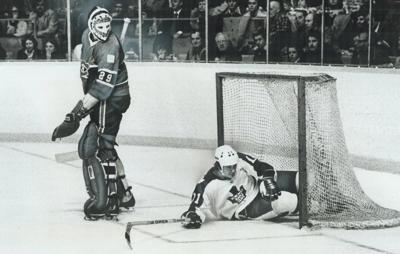In 1983, Ken Dryden published┬Ā, the best book ever written about hockey and,┬Ā, one of the top 10 books in sports history. When Dryden died of cancer last Friday, at the age of 78,┬Āthat book wasnŌĆÖt mentioned until the 19th paragraph of his obituary in The Canadian Press.
ThatŌĆÖs the kind of life he led, in which a piece of work that would be the crowning achievement of most peopleŌĆÖs careers merits barely a nod in the context of DrydenŌĆÖs remarkable biography. Hockey Hall of Fame goalie, lawyer, writer, teacher, executive, federal cabinet minister ŌĆö he refused to ŌĆ£pick a lane.ŌĆØ And weŌĆÖre all better for it.
At six-foot-four inches tall, Dryden was a literal giant on the ice, as well as a metaphorical one off it. He embodied bigness: in the number of things he did (and did well) and in the scope of his ideas, especially about Canada and its place in the world.
If millions of fans hadnŌĆÖt personally witnessed it, DrydenŌĆÖs hockey career would be thought of as literally incredible today. With the Montreal Canadiens, he was named most valuable player of the Stanley Cup playoffs┬Āeven before┬ĀheŌĆÖd won NHL rookie of the year.
He won six championships in only eight professional seasons. He was in net when┬ĀTeam Canada made history against the Soviet Union in 1972. (He was also somehow ). He won┬Āthree-quarters┬Āof the games he played. If there were a Hockey Hall of Even More Fame, Dryden would be a first-ballot inductee.
And he accomplished much of that while attending law school. In fact, he took a year off in the middle of his short NHL career to article at a firm in Toronto. After retiring from hockey, Dryden practised and taught law, then became a writer ŌĆö not just of books about hockey (although he did┬Ā╠²▓╣╠²╠²┤Ū┤┌╠²) but also a novel about┬Ā, plus non-fiction works on┬Ā and .
He served as president of the ║ŻĮŪ╔ńŪ°╣┘═°Maple Leafs from 1997 to 2003, then ran for office and became an MP for York Centre, serving as a cabinet minister . In 2006, he ran for the Liberal leadership.
I was on the convention floor in Montreal when DrydenŌĆÖs leadership bid went down in flames. He wasnŌĆÖt a noted orator, but I remember his speech well ŌĆö because it sounded as if heŌĆÖd read it from one of his books or essays, his authorial style and big-picture philosophizing evident in every phrase.
He began by enumerating the many parts of Canada heŌĆÖd visited during his campaign, noting the diversity you can find throughout this country, the multitudes we contain. ŌĆ£ItŌĆÖs the bigness of this place, not the distances,ŌĆØ he said. ŌĆ£Our spirit, what weŌĆÖve done. ThatŌĆÖs us.ŌĆØ A rising conservative tide, he warned, stood against this: ŌĆ£Their understanding of Canada is so small, so pinched. Ungenerous. Divisive.ŌĆØ
WeŌĆÖre a big country, he said, one that can do big things and has done big things. ŌĆ£Whatever weŌĆÖve been,ŌĆØ he added, ŌĆ£we will be far more in the future.ŌĆØ In his 2010 book, Becoming Canada, Dryden returned to that theme, arguing that Canadians should understand their country as ŌĆ£something biggerŌĆØ than what theyŌĆÖve traditionally imagined.
Writing about the 4 Nations Face-Off earlier this year, when U.S. President Donald Trump was really leaning into his ŌĆ£51st stateŌĆØ talk, Dryden considered sports as national symbols we could learn from when faced with existential threats. ŌĆ£Everybody, every country, has something inside them that is fundamental. That matters so much that itŌĆÖs not negotiable. ThatŌĆÖs deeply, deeply personal,ŌĆØ he wrote.┬ĀŌĆ£Something that, if threatened, youŌĆÖd do anything to protect.ŌĆØ
He concluded: ŌĆ£Canadians are defiantly not-American. They will need to be much more than that in the next four years. Canadians will need to be defiantly Canadian.ŌĆØ
His idea of what ŌĆ£defiantly CanadianŌĆØ means reflected his approach to life: staying open to opportunities and ready to try different things, looking not only at the job in front of him but also at the bigger picture and the potential it represents.
Born in Hamilton, Dryden was a definitively┬Ā║ŻĮŪ╔ńŪ°╣┘═°boy who became a legend in Montreal. He was also a great Canadian, a big man who lived a big life thinking big thoughts about his big country. And weŌĆÖve lost him at a time when Canada could use much more of that.
Error! Sorry, there was an error processing your request.
There was a problem with the recaptcha. Please try again.
You may unsubscribe at any time. By signing up, you agree to our and . This site is protected by reCAPTCHA and the Google and apply.
Want more of the latest from us? Sign up for more at our newsletter page.



























To join the conversation set a first and last name in your user profile.
Sign in or register for free to join the Conversation